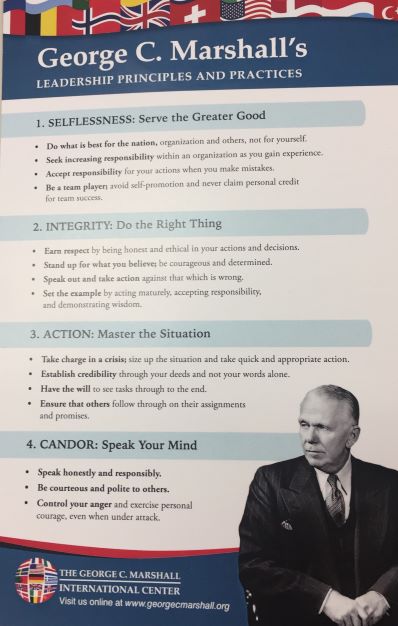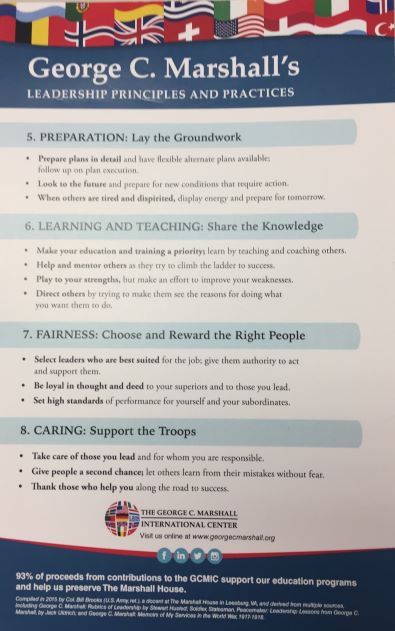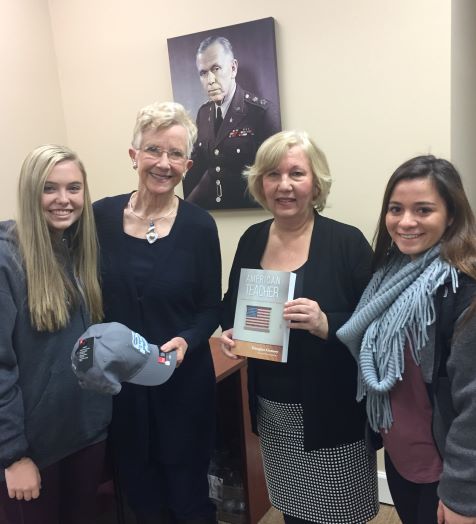
Stone Bridge Students Visit Dodona Manor
Home of General George C. Marshall

Abby and Carmen present Rachel Thompson author of Marshall: A Statesman Shaped in the Crucible of War and historian Pam Banks with appreciation for meeting with us today. Students explored the decision to drop the atomic bomb on Japan and other aspects of Marshall's career and his life in Leesburg, Virginia.
Abby
(left)
In General Groves report to General Marshall he wrote, “this undertaking
would cost hundreds of millions of dollars”. Why did it cost that much to make a
bomb?
Carmen- Did Marshall ever comment about being a primarily a soldier to receive the Nobel Peace Prize? ANSWER- He did, even mentioning it in his Nobel speech in Oslo. He said the fact that he as a soldier had been given a prize for peace wasn’t as surprising to him as it might seem to others. He noted that “the cost of war is constantly spread before me written neatly in many legers whose columns are gravestones.” He went on to say that he was deeply motivated to find some means to prevent war. He seemed to indicate that his experience as a soldier had made him even more aware of the need to avoid armed conflict.
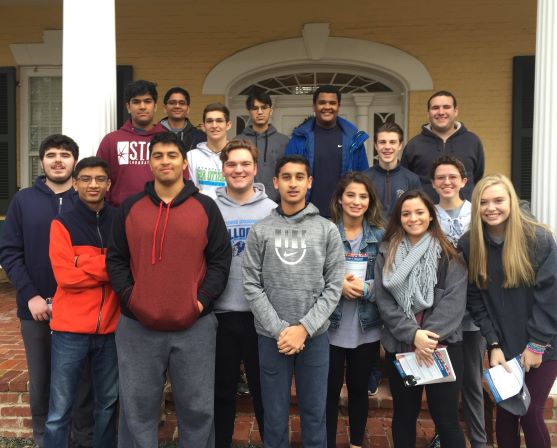
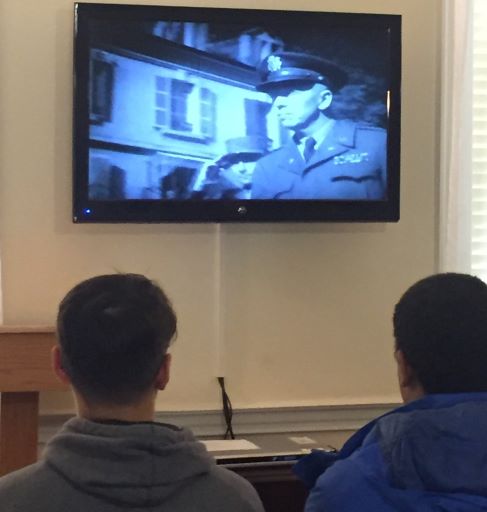
We began our program with a short video on the life of Marshall
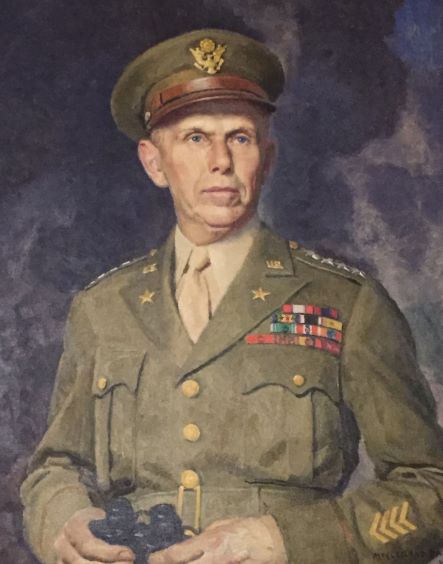
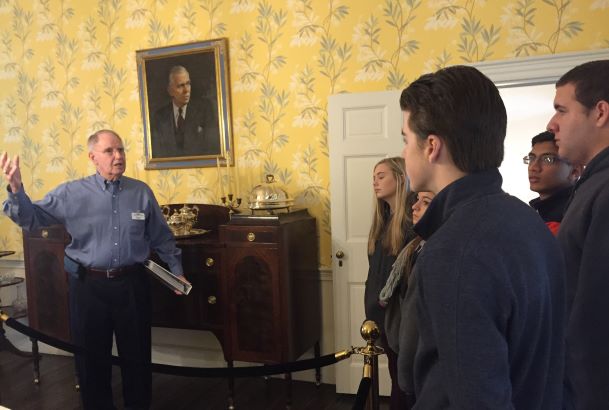
Docent Bill Brooks provided an interesting look at Marshall's years in Leesburg
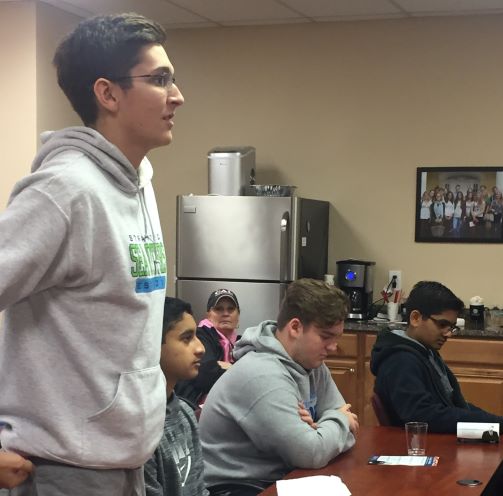
Ethan- What was Marshall's life like in Leesburg? ANSWER-He was relaxed. He spent his time in his garden and read a lot of books. His home in Leesburg was very important to him, since it allowed him to temporarily escape the tremendous pressures of a world war. A part of Marshall’s strength seemed to be his ability to work extremely efficiently while on the job, but then able to “let it go” once he was away from it. Perhaps that gave him the mental strength to handle impossible challenges, especially during the war.
Om (right) - Was there any evidence that Japan may have been trying to build an atomic bomb? ANSWER- Yes, research began in Kyoto. The Japanese never got far enough to test whatever they researched and/or worked on. The much great threat was the possibility that the Germans would develop the bomb. Ms. Banks gave you the background on that, and the fact that those efforts were thwarted by what happened in Norway.
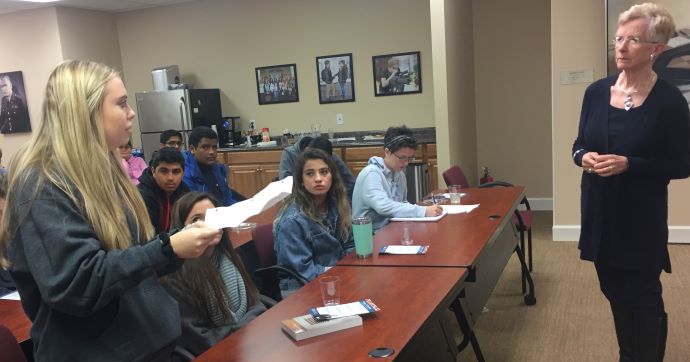
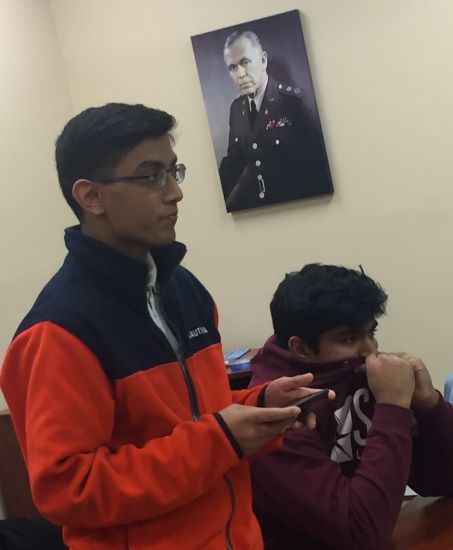
Mohib- In your book you wrote Marshall after the use of the atomic bombs, was somber, thought it wasn't a time for excessive joy and he didn't want to gloat. Did president Truman and other political and military figures respond the same way? ANSWER- Indeed, Marshall was somber, since the word had come in that Nagasaki had virtually been obliterated. He could not be joyous about that reality. Other important men involved also recognized the sheer magnitude of this new weapon—its devastation. They were relieved, certainly, since a brutal struggle, which had claimed the lives of over 291,000 American soldiers, not to mention civilians world-wide, was over. There was plenty of jubilation over that—days of celebration throughout the country. However, our leaders also saw that a dangerous new technology had arrived, and that care had to be taken for its future use.
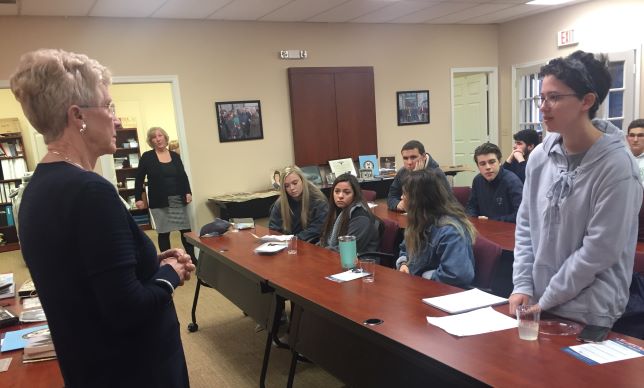
Savannah- I don't know if you know this but as the years passed
did the scientists who built the bomb have any regrets even though it won the
war? ANSWER-
England was in closer
proximity to Germany and Winston Churchill during the war vowed that England
wouldn't surrender if they were attacked by the Nazi forces. However, in the
1930s, as Hitler gained power on the continent, it seemed as if Britain was
allowing him a free hand. The memories of World War I were still on their minds.
Although protests were made, not much was done. Churchill himself, out of office
in Britain in the 30s, warned that Hitler was a threat and should be stopped. By
the time the British did try to stop Hitler—after the invasion of Poland by the
Nazi’s, Hitler’s army had become powerful. As of September 1, 1939, Britain’s
attitude of appeasement ended. After that, with Churchill in power, the British
people would fight valiantly to stop Hitler. The prime minister made it clear
that the British would not negotiate with this monster leader to give him a free
hand in Europe. If you watch the fine movie of last year, “The Darkest Hour,”
you will see that some in Britain thought that government should negotiate, get
out of the war, leave the tyrant to the rest of Europe. In the end, Hitler
turned East to invade the USSR, which took the pressure off of the British.
Because the Japanese bombed Pearl Harbor, and Germany, as a part of the
Tripartite Pact, declared war on the U.S. the great manufacturing and industrial
capabilities of the Americans to supply the war kicked in. Even if the Germans
had built an atomic weapon, an attack on the continental U.S. would have been
unlikely. What did happen to the British, is that by mid-war they were being
bombed by V-1 bombs, which the Germans had developed. It was a version of an
early cruise missile, terrifying and especially deadly.
As Ms. Banks indicated, the threat of nuclear disaster from the Germans
was thwarted.
Savannah- In one of the documents Mr. Graney gave us that was sent to Marshall “If the Germans make use of this weapon it seems probable that the attack would be made on Great Britain rather than on the United States.” Wasn’t the U.S. a bigger threat to Germany than England? ANSWER- England was in closer proximity to Germany and Winston Churchill vowed that England wouldn't surrender if they were attacked by the Nazi forces. And Hitler knew that Britain and its allies could stop him if he tried to invade and capture land in Europe, but since Britain refused to get involved (didn't want to lose their men, especially after WWI), Hitler took advantage of that and started invading other European countries. Furthermore, Hitler underestimated the US. He didn't realize that the US had increased its industrial production by converting car factories for military use, which would definitely help us and the Allies during the war.
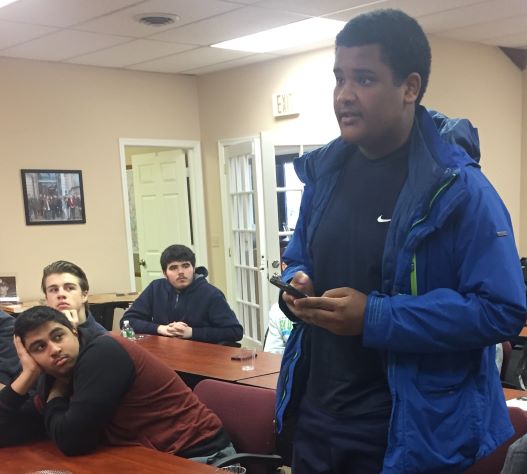
Amani- In a Top Secret memo on May 29, 1945 Marshall the bomb should be used against a “straight military objective such as a large naval installation.” Why didn’t that happen? ANSWER-They did not drop the bomb on a military target due to fear that they would move American troops to military locations. There was also the worry that the bomb could be a dud! Keep in mind, as we noted, the U.S. had developed only two bombs, and neither had been dropped from a plane. What if it didn’t work? Marshall’s opinion about a military target had to do with his concern about the impact of such a weapon on civilians. However, in the end, he believed the bomb should be dropped, since if it worked as promised, it would end the war.
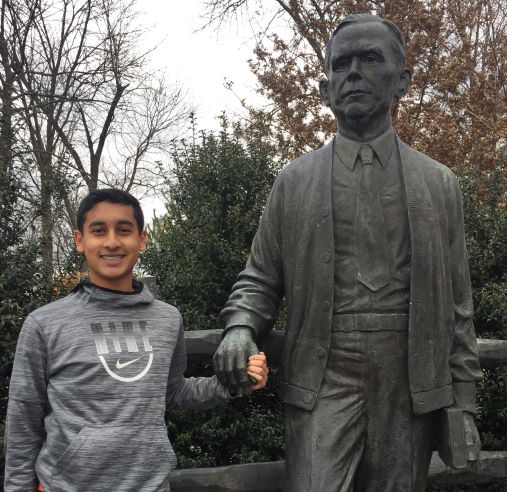
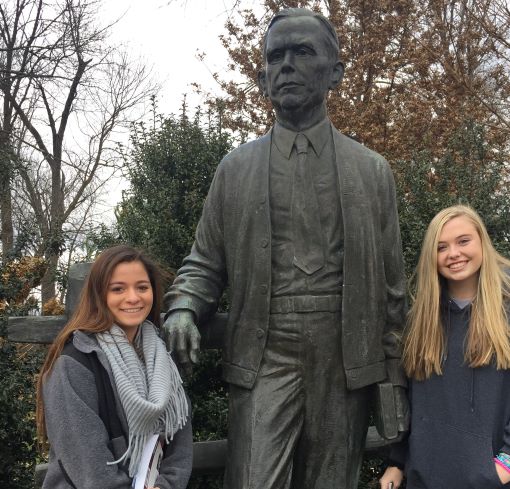
Kavin- How close do you think Germany came to building the first atomic bomb? ANSWER-In the early part of the war, Germany and the United States were both the leading countries in the development of the atomic bomb. The United States believed that Germany was 2 years ahead of them but they were actually behind the United States. Ms. Banks provided background regarding what happened there, including the damage wrought by the American bombing of the heavy water plant in Norway, as well as the fact that many brilliant Jewish German scientists came to the U.S. because of the rise of Hitler. FDR got information about the scientific breakthrough that led to the bomb from Albert Einstein’s letter even before war came, and supported moving forward on the research and development, which proved crucial to the timing.
Carmen and Abby on right.
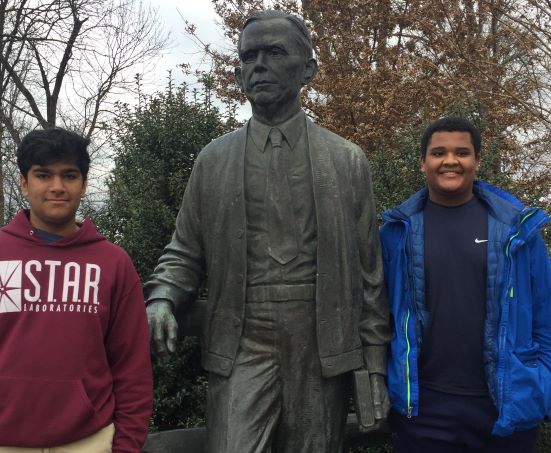
Umayya (left) If President Eisenhower asked George Marshall to aid him in his presidency would he have taken the job? ANSWER- Marshall wanted to retire in October 1945, but out of his strong sense of duty and service, he answered Truman’s call to be a special emissary to China, serve as Secretary of State, accept the responsibility of becoming chairman of the Battle Monuments Commission, the president of the American Red Cross, and, finally, Secretary of Defense. Had Eisenhower called upon him, I feel certain that Marshall would have done so had his health permitted it. Because Marshall was a 5-star general, it would not have been unusual for him to be called back at least as an advisor to a president, but, again, only if he was physically up to it. As far as I know, Eisenhower asked only one duty of him: to lead the delegation that represented the United States at the coronation of Queen Elizabeth II, which he did, despite the fact that he was not in good health at the time.
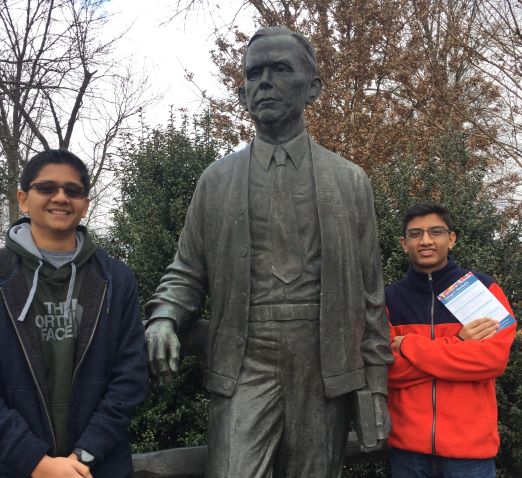
Om and Mohib on right.
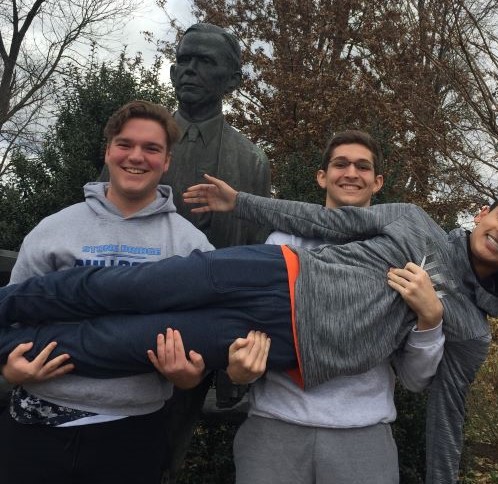
Zack, Ethan and Kavin
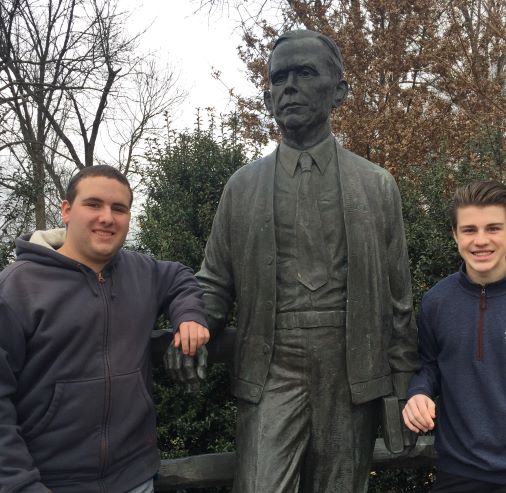
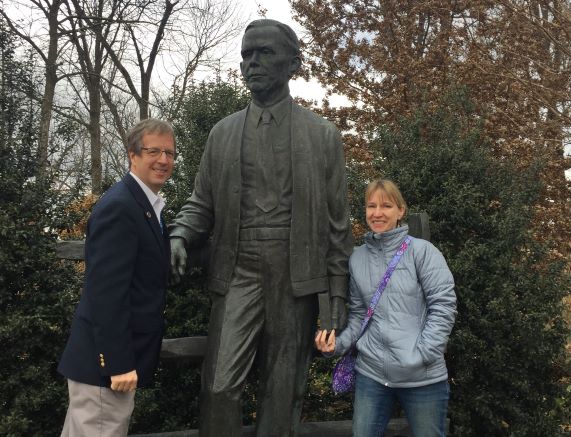
Conor And Jacob Mr. Graney and Mrs. Channing
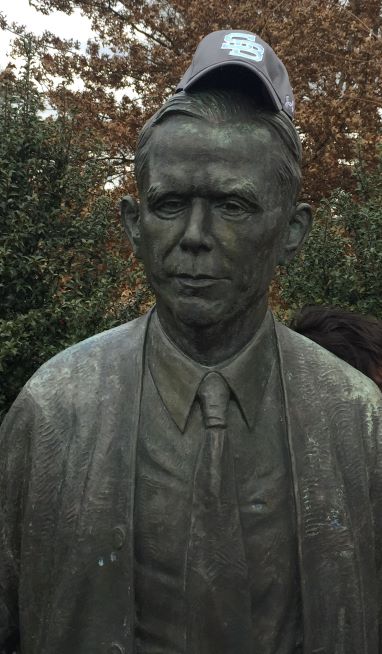
General George C. Marshall's Leadership Principles and Practices
